Are you finding it challenging to get your products or services seen by potential customers?
If so, you need to focus on SEO.
Search Engine Optimization (SEO) refers to the techniques used to enhance the visibility of your website in search engine results pages (SERPs).To ensure your target audience discovers your product or service, using the best ecommerce SEO tools is essential. While there are many SEO tools to choose from, not all of them are equally effective. In this blog post, we’ll discuss the best ecommerce SEO tools that can help you boost your online store’s success.
7 Best Ecommerce SEO Tools to Boost your Business
1. Ahrefs
At the top of our list is Ahrefs, a phenomenal ecommerce SEO tool offering keyword research, competitor analysis, link building, and more. Conduct a comprehensive SEO audit, identify broken links, track rankings, and analyze backlinks to optimize your store’s performance.

Key Features:
- Content Explorer for comparing website content
- Track critical metrics and performance
- Industry benchmarking capabilities
- All-in-one ecommerce SEO tool
2. KWFinder
Another fantastic ecommerce SEO tool is KWFinder, which is perfect for finding trending keywords. Its clean interface and actionable data simplify keyword research for boosting your business growth.
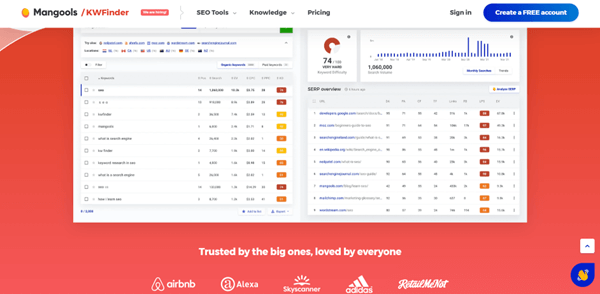
Key Features:
- Simple and user-friendly interface
- Affordable pricing
- Evaluates SERP competition strength
- Informative and intuitive dashboard
3. Helium10
Unlock the potential of selling on Amazon with Helium10. This powerful ecommerce SEO tool provides a comprehensive ASIN database of over 450 million products, allowing you to compare and find the best-selling opportunities. With advanced keyword research and listing optimization features, Helium10 helps you manage your Amazon business like a pro.

Key Features:
- Detailed product information
- Extensive keyword database
- Access to external traffic sources
4. Raven SEO Tools
Take your ecommerce SEO to new heights with Raven SEO Tools. This suite of comprehensive tools empowers you to conduct in-depth competitor research, understand keyword choices, review landing pages, and optimize your ecommerce product page SEO. With robust reporting capabilities and seamless integration with other social media marketing tools, Raven is a must-have for optimizing your online presence.
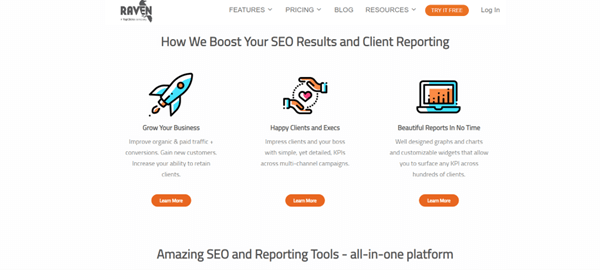
Key Features:
- In-depth insights into competitors
- Robust keyword tracking tools
- Integration with Google Data Studio
- Site Auditor tool for thorough website analysis
5. SEMRush
Optimize your store and conversion rates with SEMRush, a phenomenal ecommerce SEO tool. Identify high-ranking posts, uncover areas for improvement, and conduct thorough keyword research, including PPC keywords. Trusted by leading brands, SEMRush is a comprehensive on-page and off-page SEO solution.
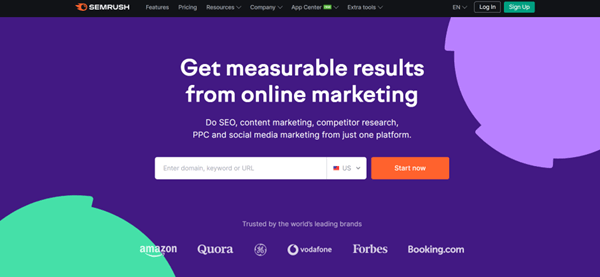
Key Features:
- Position tracking tool
- Hyper-targeting with ZIP codes
- Reports for competitor discovery
- Integration with Google Data Studio
6. Moz Pro
Take your SEO performance to the next level with Moz Pro. This top-rated ecommerce SEO tool offers a wide range of research tools and resources to enhance your understanding of SEO and inbound marketing. With a 30-day free trial, Moz Pro is perfect for running campaigns and promoting seasonal products.
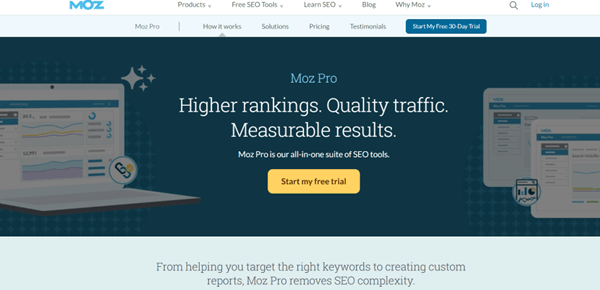
Key Features:
- Excellent research tool
- Extensive resources section
- Crawler issue notifications
- Detailed dashboard for comprehensive SEO performance insights
7. Ubersuggest
For a free option, consider Ubersuggest by Neil Patel. This reliable SEO tool provides content optimization ideas, long-tail keyword suggestions, SERP overviews, and competitor performance insights. Ubersuggest is ideal for site audits, offering valuable information based on organic monthly traffic and keywords.
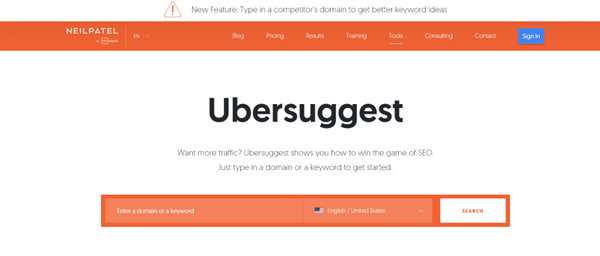
Key Features:
- Reliable and updated data
- User-friendly interface
- Convenient content and competitor analysis
Apart from these exclusive tools, here are some of the free tools that Google offers for scaling up your ecommerce business:
Free Google Tools
Unlock the power of free Google tools unveiling an arsenal of invaluable resources, webmasters and eCommerce website developers harness the might of free Google tools to propel their SEO endeavors. These indispensable companions include:
a. Google Analytics
A treasure trove of SEO analytics, Google Analytics furnishes vital data, enabling comprehensive monitoring of SEO performance. From keyword insights to goal tracking and conversion analysis, this tool empowers webmasters to optimize their web pages through informed decisions.
b. Google Search Console
For a holistic perspective, coupling Google Analytics with Google Search Console is imperative. Unveiling search queries and providing in-depth information on clicks, impressions, and CTR %, this dynamic duo uncovers opportunities for keyword enhancement and improved landing page efficacy.
c. Google AdWords
Keyword Planner Crafting impactful ad campaigns hinges on selecting the most suitable keywords. Enter the Google AdWords Keyword Planner, an invaluable aid for identifying search volumes, gauging trends, and estimating bid costs, enabling marketers to fine-tune their advertising strategies.
d. Google My Business
In the quest for visibility, Google My Business emerges as a potent ally. By creating a free business profile seamlessly integrating with Google Search and Maps, enterprises can effortlessly connect with customers and establish a compelling online presence.
e. Google Structured Data Testing Tool
Meticulously validating and optimizing web pages becomes a breeze with the Google Structured Data Testing Tool. From creating new pages to ensuring accuracy in structured data implementation, this tool sets the stage for enhanced search engine visibility.
f. Google Tag Assistant
Legacy troubleshooting tags and ensuring seamless integration of Google Analytics and Google Tag Manager are made effortless by Google Tag Assistant. This invaluable assistant detects tag presence, identifies errors, and offers actionable suggestions to fine-tune implementation.
g. Google PageSpeed Insights
Accelerating web page performance takes center stage with Google PageSpeed Insights. By providing detailed analysis and suggestions for optimization on mobile and desktop devices, this tool empowers webmasters to fine-tune their digital experiences for maximum impact.
Now that you have a plethora of tools to choose the best ecommerce SEO tools for your business, let us understand why choosing an SEO tool is necessary:
Why are Ecommerce SEO Tools Necessary?
Ecommerce SEO tools offer a wide range of benefits that can significantly enhance your online store’s performance. Let’s delve into these advantages in more detail:
Accurate Reporting: Utilizing ecommerce SEO tools allows you to gain precise insights into the ranking position of your ecommerce store. These tools provide comprehensive reports on keyword rankings, organic traffic, and other crucial metrics. With this information, you can monitor your website’s performance, track progress, and make data-driven decisions to improve your SEO strategy effectively.
Content Gap Analysis: Ecommerce SEO tools enable you to analyze and compare your content with that of your competitors. By assessing your competition’s performance, you can identify content gaps, areas where your competitors have an advantage in rankings or keywords. This knowledge empowers you to optimize your content strategy and bridge those gaps, ensuring that your website offers comprehensive and relevant information to attract more organic traffic.
Keyword Identification: An essential aspect of effective SEO is targeting the right keywords. Ecommerce SEO tools assist in identifying relevant and high-performing keywords for your niche. These tools provide keyword research capabilities, allowing you to discover valuable terms and phrases that potential customers are searching for. By optimizing your website’s content with these targeted keywords, you increase the chances of ranking higher in search engine results, attracting more qualified traffic to your ecommerce store.
Enhanced Content Strategy: Ecommerce SEO tools are pivotal in formulating a robust content strategy. By analyzing keyword trends, search volume, and user intent, these tools guide you in creating valuable and engrossing content that resonates with your target audience. With a well-defined content strategy, you can optimize your website’s pages, blog posts, and product descriptions, ensuring they align with search engine algorithms and user expectations.
Improved Product Descriptions: Effective product descriptions are crucial for enticing customers and driving sales. Ecommerce SEO tools can assist in crafting compelling and persuasive product descriptions optimized for search engines. These tools provide insights into relevant keywords, suggest improvements for better readability, and highlight areas for optimization. By leveraging these tools, you can enhance your product descriptions to attract organic traffic, improve user experience, and increase conversions.
Conclusion
In today’s digital age, it is crucial to optimize your website for search engines.. Using the best ecommerce SEO tools can improve your website’s ranking in search results, attract more visitors, and boost your sales.
Many other factors, such as content quality, backlinks, and user experience, can contribute to your website’s SEO success. However, using the right tools and following best practices can give your website a significant edge over the competition.
FAQs
1. What are ecommerce SEO tools?
Ecommerce SEO tools are software or online platforms specifically designed to assist online retailers in optimizing their websites for search engines. These tools provide features such as keyword research, competitor analysis, site audits, backlink analysis, and performance tracking to help improve the visibility and organic rankings of ecommerce stores.
2. Why are ecommerce SEO tools important?
Using ecommerce SEO tools is necessary for businesses that want to enhance their online visibility and attract more organic traffic. By optimizing product pages, improving site structure, targeting relevant keywords, and analyzing competition, these tools assist in boosting the search engine rankings of ecommerce websites, resulting in increased visibility, targeted traffic, and potential sales.
3. What features should I look for in an Ecommerce tool?
When selecting an ecommerce SEO tool, look for characteristics such as keyword research and tracking, competitor analysis, on-page optimization suggestions, backlink analysis, site auditing, and performance monitoring. Additionally, consider user-friendliness, integration capabilities, reporting capabilities, and customer support to ensure the tool meets your specific needs and helps you achieve your SEO goals efficiently.





